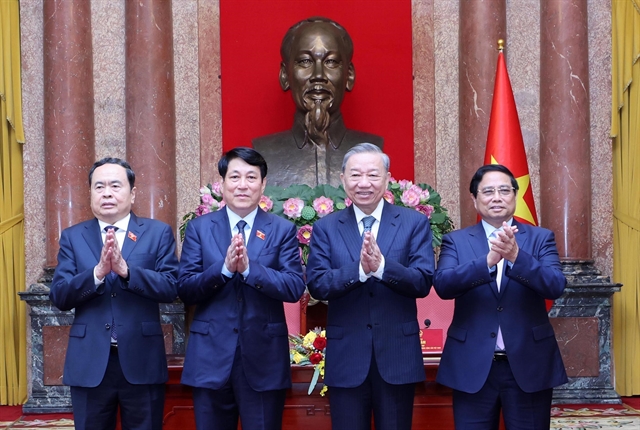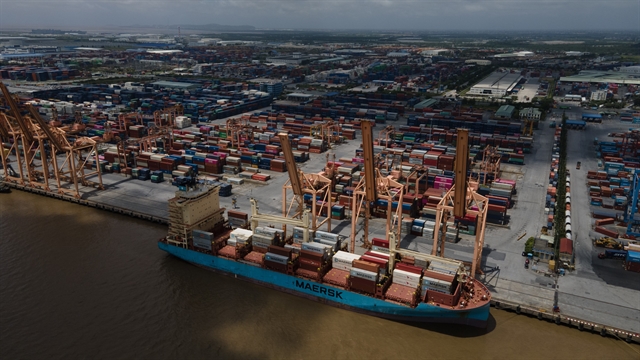International friends hail Communist Party of Việt Nam's leadership_top nhà cái khuyến mãi
作者:Nhận Định Bóng Đá 来源:Thể thao 浏览: 【大中小】 发布时间:2025-02-03 04:49:31 评论数:
International friends hail Communist Party of Việt Nam's leadership
February 02,top nhà cái khuyến mãi 2025 - 20:39 |
| From left to right: National Assembly Chairman Trần Thanh Mẫn, State President Lương Cường, Party General Secretary Tô Lâm and Prime Minister Phạm Minh Chính. —VNA/VNS Photo |
HÀ NỘI — The Communist Party of Việt Nam (CPV) has affirmed its essential role in the country’s development process, said General Secretary of the Communist Party of India (CPI) Doraisamy Raja in an interview granted to the Vietnam News Agency in New Delhi given the CPV’s 95th anniversary (February 3).
He noted that the CPV’s establishment addressed major challenges Việt Nam faced under colonial oppression, providing ideological and organisational foundations for the national liberation movement. Introducing Marxism-Leninism to Việt Nam, the Party linked the country’s struggle for independence with the global communist movement, shaping a scientific and systematic revolutionary approach that united workers and farmers against imperialism and feudalism.
According to him, in the early 1940s, under the leadership of President Hồ Chí Minh, the CPV adapted to changing circumstances by forming the Việt Minh Front in 1941, bringing together patriotic forces. This strategic move expanded and strengthened the national liberation movement. By taking advantage of global developments during World War II, the Party mobilised the masses, established armed resistance, and secured liberated zones. These efforts culminated in the successful August Revolution of 1945, leading to Việt Nam’s declaration of independence and the establishment of the Democratic Republic of Việt Nam.
The CPI leader underscored that Việt Nam’s victories in the resistance wars against French colonialism and American imperialism reflected the CPV’s strategic vision, mass mobilisation capabilities, and unwavering commitment to national liberation and socialism. He stressed that the Party’s revolutionary leadership has endured because of its ideological clarity, adaptability, and deep connection with the people – factors that have not only ensured past triumphs but continue to guide Việt Nam’s progress and sovereignty today.
Raja assessed that Việt Nam’s Đổi mới (Renewal) policy marked a transformative period in the country’s modern history by shifting from a centrally planned economy to a socialist-oriented market economy. The CPV’s leadership in this transition was characterised by its strategic vision, adaptability, and unwavering commitment to socialism, national development, and public welfare. He noted that the Party’s decision to implement Đổi mớireflected a profound understanding of Việt Nam’s socio-economic conditions and global trends.
He also credited the CPV’s leadership with maintaining political stability, which has been crucial to Việt Nam’s successful reforms. The Party’s focus on national unity and consensus-building has enabled it to navigate complex socio-economic challenges while avoiding pitfalls such as division or social unrest.
Regarding Việt Nam’s ongoing fight against corruption and efforts to streamline the administrative system, Raja stressed their importance in maintaining the Party’s leadership role and ensuring sustainable national development. He noted that they not only protect the CPV’s credibility and legitimacy but also drive economic and social progress, reinforcing a socialist state that genuinely serves the people. By holding senior officials accountable and ensuring that no one is above the law, the CPV has strengthened public trust in its leadership, he said.
Looking ahead, Raja affirmed that Việt Nam’s ambitious national development goals are achievable, reflecting a clear vision for sustainable growth, global integration, and improved living standards. He said the CPV’s ability to tackle challenges such as economic inequality, climate change, and geopolitical tensions will be crucial in realising the country’s aspirations and cementing its status as a respected and influential nation on the global stage.
Growth potential in apparatus streamlining
 |
| Containers at Tân Vũ Port, Hải Phòng City. Việt Nam has achieved significant success in socio-economic development under the leadership of the CPV. VNA/VNS Photo |
Emeritus Professor Carl Thayer, from the Australian Defence Force Academy at the University of New South Wales, praised the CPV's leadership in the country's renewal, especially the role of late General Secretary Nguyễn Phú Trọng.
Thayer recognised the late Party chief for his successful leadership of the CPV, overseeing sustained economic growth averaging 5.5 per cent from 2011 to 2023, except during the COVID-19 pandemic. He also highlighted Trọng’s leadership in tackling corruption and other negative phenomena, promoting Party building, addressing the pandemic, and earning global recognition for the CPV’s role in foreign affairs.
General Secretary Trọng’s anti-corruption campaign made measurable progress raising Việt Nam’s score on Transparency International’s Perceptions of Corruption Index from 2.9 in 2011 to 41 in 2023. The Perceptions of Corruption Index ranks over 180 countries on a scale from 0 (highly corrupt) to 100 very clean.
According to the Australian scholar, the campaign against corruption is a necessary but not sufficient requirement to achieve Việt Nam’s development goals.
Việt Nam needs to continue the corruption combat but something else must be done. Việt Nam must streamline the state apparatus in order to facilitate the modernisation of its means of production to take advantage of the Fourth Industrial Revolution such as technological innovation, digitisation, artificial intelligence, and quantum computing, said Thayer.
The CPV has identified that Việt Nam is on the brink of entering a new era of growth. Regarding the goals that Việt Nam has set for 2030 and 2045, he said the objectives are necessary to prevent Việt Nam from falling into the middle-income traps, adding the factors that led to Việt Nam’s current growth such as labour-intensive manufacturing is no longer sufficient to boost income and productivity to higher.
According to Thayer, the ongoing campaign to streamline the state apparatus provides Việt Nam with the opportunity to develop the capacity needed to transition to technology-intensive production. This shift could foster a growing middle class and boost domestic consumption.
Việt Nam has the potential to become a reliable player in the global supply chain for high-tech products like computer chips, solar panels, and electric vehicles, Thayer suggested. He recommended leveraging the country’s expanding network of strategic partnerships to achieve this.
Citing the myriad challenges Việt Nam faces such as overcoming bureaucratic resistance to change, reforming its bureaucratic structures, and finding foreign investment to upgrade human resources for the new technological era, Thayer recommended developing a highly skilled technology-savvy workforce; developing well-integrated domestic value chains; proactively deepen regional trade integration; shifting from labour-intensive production to technology-intensive high-value production; and reducing carbon-intensive manufacturing to low-carbon production. — VNS
